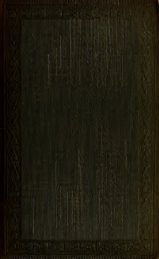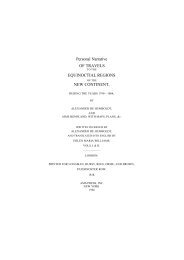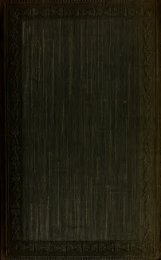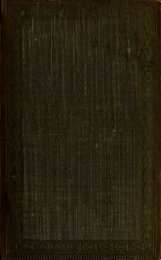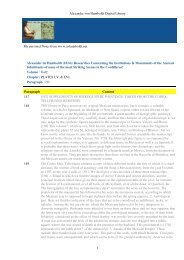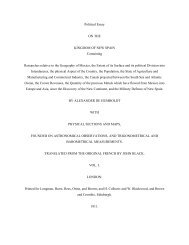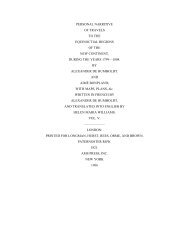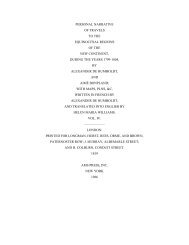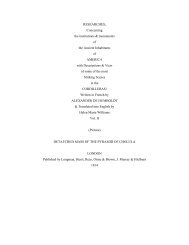- Page 1:
"1 I; I I \]\' I
- Page 7 and 8:
COSMOS: A SKETCH OF A PHYSICAL DESC
- Page 9 and 10:
CONTENTS OF VOL. li. PART I. INCITE
- Page 11 and 12:
CONTENTS. fhe vast Sphere of new Id
- Page 13:
CONTEXTS. vn The Zodiacal Light 329
- Page 16 and 17:
X SUMMARY OF THE CONTENTS. VIII. Re
- Page 18 and 19:
XL SUMMARY OF THE CONTENTS ry of th
- Page 20 and 21:
nV SUMMARY OF THE C0i\TEl\T3. niir
- Page 22 and 23:
XVI SUMMARY UF THE CONTExVTS. nent
- Page 24 and 25:
XVIU SUMMARY OF THE CONT.G\TS. arem
- Page 26 and 27:
20 COSMOS. more widely-diffL .ed cu
- Page 28 and 29:
2U COSxMO.^. remarks, they must not
- Page 30 and 31:
24 COSMOS. the inanimate world of p
- Page 32 and 33:
20 COSMOS. to extol li.s native Col
- Page 34 and 35:
88 cozmwi. Oil account of the renow
- Page 36 and 37:
30 COSMOS^. disposition to practica
- Page 38 and 39:
32 COSMOS. mountain teliind the old
- Page 40 and 41:
S4 uosMos. member, "liow, by the fo
- Page 42 and 43:
St> COSMOS. scribe batt](3-fields,
- Page 44 and 45:
Sj^ cosmos. but he likewise ciitert
- Page 46 and 47:
40 COSMOS probably less well known
- Page 48 and 49:
|2 COSMOS. bhores in peaL'eful spor
- Page 50 and 51:
44 COSMOS. peatedly expressed, that
- Page 52 and 53:
46 COSMOS. maidens is disheveled by
- Page 54 and 55:
48 COSMOS. tnanner in the introduct
- Page 56 and 57:
50 COSMOS. tule one of the most rem
- Page 58 and 59:
52 cos »io3. Arians or Persiins, w
- Page 60 and 61:
54 COSMOS. sian literature does not
- Page 62 and 63:
56 COSMOS. the nightingale and the
- Page 64 and 65:
6 COSMOS. ment are a faithM reflect
- Page 66 and 67:
50 CU5M0S. Wliere nature has but sp
- Page 68 and 69:
62 COSMOS. 1 liLve endeavored, in t
- Page 70 and 71:
64 COSMOS. made on Lis mind by the
- Page 72 and 73:
6 COSMOS. fied witn literary compos
- Page 74 and 75:
68 COSMOS. elegiac idyllic element
- Page 76 and 77:
70 COSMOS. of Europe,* from the col
- Page 78 and 79:
7^ COSMOS. This enthusiastic poetic
- Page 80 and 81:
74 COSMOS. er, iu ^ing Lf^ai', ^\ll
- Page 82 and 83:
76 COSMOS. A greater depth of feeli
- Page 84 and 85:
78 COSMOS. velopmeiit of language c
- Page 86 and 87:
80 COSMOri. the power possessed by
- Page 88 and 89:
62 COSMOS aJl organic germs, that h
- Page 90 and 91:
•Si COSMOS. Delphi. Among the pai
- Page 92 and 93:
St5 i:usM03. ami graphical represen
- Page 94 and 95:
SS COSMOS. tul but almost timid imi
- Page 96 and 97:
90 COSMOS. served as the representa
- Page 98 and 99:
92 COSMOS. as paintings, and partly
- Page 100 and 101:
94 COSMOS. begun to acquire a certa
- Page 102 and 103:
painters, and thus lieighteaing the
- Page 104 and 105:
98 COSMOS. landscape painting on a
- Page 106 and 107:
too COSMOS. anliniited in space, it
- Page 108 and 109:
102 CCSMOS. J'he gardens of the Asi
- Page 110 and 111:
104 " COSMOS freshness of the meado
- Page 112 and 113:
106 COSMOS. PART II. HISTORY OF THE
- Page 114 and 115:
108 COSMOS. either vague, or blende
- Page 116 and 117:
110 COSMOS. of the natural characte
- Page 118 and 119:
11'^ cosxwog From tlie above consid
- Page 120 and 121:
114 COSMOS jivmLent that we should
- Page 122 and 123:
116 COSMOS. These central points iv
- Page 124 and 125:
118 COSMOS. which they do not ah'ea
- Page 126 and 127:
120 COSMOS. nesus, nut far from the
- Page 128 and 129:
122 COSMOS. But that Avhich, as has
- Page 130 and 131:
124 COSMO? em early and distinguish
- Page 132 and 133:
126 COSMOS. lauds of the Scytliiaii
- Page 134 and 135:
128 COSMOS. and powerfully develope
- Page 136 and 137:
130 COSMOS. glass-wares, tissues, a
- Page 138 and 139:
132 COSMOS. iEstii on the Baltic, o
- Page 140 and 141:
134 COSMOS mg Wiio&e precise period
- Page 142 and 143: 13(5 COSMOS. In the enumeration of
- Page 144 and 145: 138 COSMOS. made at^quaiiited with
- Page 146 and 147: 140 COSMOS. between flashes of lisl
- Page 148 and 149: 142 COSMOS. Uralian Mountains, Euro
- Page 150 and 151: 1 44 COSMOS. the reciprocal reflect
- Page 152 and 153: 146 COSMOS. At the northeustern ext
- Page 154 and 155: 148 COSMOS. is situated wUhin a mor
- Page 156 and 157: 150 IJOSMOS. Greece itself. Theso c
- Page 158 and 159: 152 COSMOS. Azores, finall) came to
- Page 160 and 161: 154 cosMOji. introddction from the
- Page 162 and 163: 156 CG3M03 thenes, Nearchus, Aristo
- Page 164 and 165: XbS coSxMos. Mere certain kiiovledg
- Page 166 and 167: 180 COSMOS. abroad b^ the conquests
- Page 168 and 169: 162 COSMOS. May nol the knowledge o
- Page 170 and 171: 164 COSMOS. already, before the cam
- Page 172 and 173: i66 coSx>ios. ed negro races, which
- Page 174 and 175: 168 COSMOS. not go further back tha
- Page 176 and 177: 170 COSMOS. EXTENSION OF THE CONTEM
- Page 178 and 179: i*72 COSMOS. of Africa by Cyrene an
- Page 180 and 181: (74 COSMOS. noblest type, in the ef
- Page 182 and 183: 176 tosMos. great scientific instii
- Page 184 and 185: 178 COSMOS. vestigatlon of the cons
- Page 186 and 187: ISO COSMOS. imiVERSAL DOMINION OF T
- Page 188 and 189: 182 josMos only the greatest divers
- Page 190 and 191: 184 codMos. pie , but, alter the gr
- Page 194 and 195: 188 COSMOS geo^aphical information
- Page 196 and 197: ISO COSMOS. of tlie breaking forth
- Page 198 and 199: 192 COSMOS. until after a p3riod of
- Page 200 and 201: 194 COSMOS. This lattei mode of pro
- Page 202 and 203: 19t) COSMOS. earth's surface, and a
- Page 204 and 205: 198 C03MJS. the grand unity of natu
- Page 206 and 207: 200 COSMOS. INVASION OF THE ARABS.
- Page 208 and 209: 202 COSMOS. besides the influence t
- Page 210 and 211: 204 C0SM03. As the life of nations
- Page 212 and 213: 806 COSMOS universal traffic with I
- Page 214 and 215: 208 'josMos. in cities, Avliile in
- Page 216 and 217: 210 COSMOS. estimate by the measure
- Page 218 and 219: 812 COSMOS. ment to the- mental cul
- Page 220 and 221: 214 COSMOS of I'actri, even from th
- Page 222 and 223: *H6 COSMOS. nevertheless, the zoolo
- Page 224 and 225: 218 COSMO:?. chemistry, a science f
- Page 226 and 227: 220 COSMOS. Although tlie purity an
- Page 228 and 229: 822 COSMOS. periodic course of the
- Page 230 and 231: 224 c 0SMO3. eral mass of matheii.a
- Page 232 and 233: 326 COSMOS. problem, concerning wki
- Page 234 and 235: 228 COSMOS. probaLl} have supervene
- Page 236 and 237: 230 COSMOS. once awakened, was soon
- Page 238 and 239: 232 COSMOS. cipal settLment of the
- Page 240 and 241: 4*Si COSMOS. by able commentaries.*
- Page 242 and 243:
236 COSMOS. That this first discove
- Page 244 and 245:
238 COSMOS. bus, in a work " On the
- Page 246 and 247:
^iO COSMOS. but it was not from the
- Page 248 and 249:
242 COSMOS. Rs were eagerly taken u
- Page 250 and 251:
244 COSMOS. main of analytic chemis
- Page 252 and 253:
•246 COSMOS. the Almagest. As he,
- Page 254 and 255:
S48 COSMOS. and chemical treatises
- Page 256 and 257:
250 COSMOS. iireat maritime nations
- Page 258 and 259:
i52 COSMOS. er refer to Pius ? tlie
- Page 260 and 261:
254 COSMOS. zius of Beauvais giv(s
- Page 262 and 263:
25t> COSMOS, and stars.'* It can no
- Page 264 and 265:
258 COSMOS. navigation of the Spani
- Page 266 and 267:
260 ^osm: s. poraries of Columbus.
- Page 268 and 269:
202 COSMOS. peai from Las Casas's m
- Page 270 and 271:
2G4 COSMOJs. the Arabian and Jewish
- Page 272 and 273:
266 COSMOS. which baJies the wester
- Page 274 and 275:
208 COSMOS. to west over half of th
- Page 276 and 277:
270 COSMOS east to northwest, in a
- Page 278 and 279:
272 cosiMos. thermal substances or
- Page 280 and 281:
274 C0S3I0S means assume i similar
- Page 282 and 283:
276 COSMOS the Middle Ages were to
- Page 284 and 285:
278 COSMOS. possessions, at i dista
- Page 286 and 287:
580 COSMOS. netic ani a Li'onomical
- Page 288 and 289:
^82 COSMOS. Bacon ;* to the decreas
- Page 290 and 291:
284 COSMOS. ally on the subject on
- Page 292 and 293:
286 COSMOS. "the case at the time o
- Page 294 and 295:
288 cos-Mos. The less regular distr
- Page 296 and 297:
290 cosMoy. ta, in liis Hhtoria Nat
- Page 298 and 299:
292 rosMoa. time clcar]y distinguis
- Page 300 and 301:
294 COSMOS. have lost sight of land
- Page 302 and 303:
296 COSMOS. The age of the Conqii'i
- Page 304 and 305:
'298 cosMus. biouglit nearer to Eur
- Page 306 and 307:
SOO COSMOS. py the easteia shores o
- Page 308 and 309:
302 COSMOS. the telescope, through
- Page 310 and 311:
304 cOx^Mos. for thirty-three years
- Page 312 and 313:
503 COSMOS. not, necessarily cither
- Page 314 and 315:
308 COSMOS. tern which bears his im
- Page 316 and 317:
SIO COSMOS. other, or, in other wtr
- Page 318 and 319:
312 COSMOS. Among all the opinions
- Page 320 and 321:
314 COSMOS. The figurative and poet
- Page 322 and 323:
816 cusMus. as solid bodies of mate
- Page 324 and 325:
318 COSMOS. Laprey in the important
- Page 326 and 327:
320 COSMOS. he first directed towar
- Page 328 and 329:
322 COSMOS. periodic times were as
- Page 330 and 331:
324 COSMOS. The S2:)ots ui)on the s
- Page 332 and 333:
326 coSxMos. also, Irom a letter of
- Page 334 and 335:
328 COSMOS. before the discovery of
- Page 336 and 337:
330 COSMOS. pie. In our ow4 time, t
- Page 338 and 339:
332 COSMOS. pia i with the double r
- Page 340 and 341:
B84 :osM03. the consideration of te
- Page 342 and 343:
336 COSMOS. lines. Never before, I
- Page 344 and 345:
8^8 COSMOS. tions regarding the tem
- Page 346 and 347:
•i40 COSMOS I'cct view was taken
- Page 348 and 349:
342 COSMOS. and of the IGOO, under
- Page 350 and 351:
314 COSMOS. ity of the air, which a
- Page 352 and 353:
346 COSMOS. saltpetre on clay walls
- Page 354 and 355:
348 COSMOS the former beds of straa
- Page 356 and 357:
350 COSMOS. es by fusion and solidi
- Page 358 and 359:
352 COSMOS. tliemselves in. tones,
- Page 360 and 361:
35i COSMOS. made t) determine their
- Page 362 and 363:
356 COSMOS. nnfrequently the physic
- Page 364 and 365:
.358 COSMC';!. aluable tmnslatioiis
- Page 366 and 367:
3ll ) COSMOS Creuzer on the "Adonis
- Page 368 and 369:
382 COSMOS, writings of Ctesias, 15
- Page 370 and 371:
364 COSMOS. Arabic. 224 ; of the Mi
- Page 372 and 373:
'S66 itable truth to nature of his
- Page 379:
^ cp



